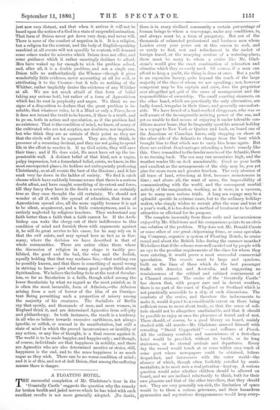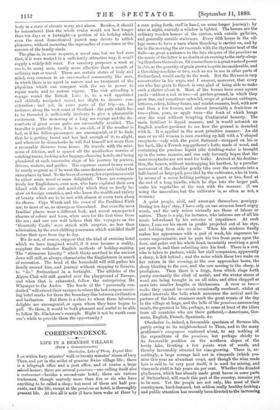A FLOATING HOTEL.
rrtFE successful completion of Mr. Gladstone's tour in the Grantully Castle ' suggests the question why the remedy for broken health and jaded nerves which he has tried with such excellent results is not more generally adopted. 1No doubt, there is in every civilised community a certain per-oentage of human beings to whom a sea-voyage, under any conditions, is, and always must be, a form of purgatory. But out of the thousands of exhausted professional and business men whom London every year pours out at this season to seek, and so rarely to find, rest and refreshment in the racket of foreign travel, or the wearying routine of a watering-place, there must be many to whom a cruise like Mr. Glad- stone's would give the exact combination of relaxation and stimulus which they so sorely need. Of course, if a man can• afford to keep a yacht, the thing is done at once. But a yacht is an expensive luxury, quite beyond the reach of the large majority of the class of whom we are speaking ; nor, however competent may be his captain and crew, does the proprietor ever altogether get quit of the cares of management and the responsibilities of ownership. The small coasting steamers, on, the other hand, which are practically the only alternative, are badly found, irregular in their times, and generally uncomfort- able. We have heard of a hard-worked clergyman, who was so well aware of the incomparable reviving power of the sea, and yet so unable to find means of enjoying it under tolerable con- ditions nearer home, that he frequently spent his annual holiday in a voyage to New York or Quebec and back, ou board one of the American or Canadian liners, only stepping on shore at the other side of the Atlantic to change from the boat which, brought him to that which was to carry him home again. But there are evident disadvantages attending a heroic remedy like this. Once committed to the tender mercies of the Atlantic, there is no turning back. The sea may run mountains high, and the weather render life on deck unendurable. Good as your berth and excellent as the arrangements of the ship may be, you yet pine for more room and greater freedom. The very absence of all trace of land, refreshing at first, becomes monotonous in time ; and above all, the want of news, the impossibility of communicating with the world, and the consequent morbid' activity of the imagination, working, as it were, in a vacuum,. are to many men serious trials. A long sea voyage may be a splendid specific in extreme cases, but to the ordinary holiday- maker, who simply wishes to recruit after the wear and tear of a year's work, it is too drastic a method of treatment to be either • attractive or effectual for its purpose.
The complete immunity from these evils and inconveniences enjoyed by Mr. Gladstone and his companions points to an obvie ous solution of the problem. Why does not Mr. Donald Currie or some other of our great shipowning firms, or some speculat- ing Company, organise a system of Floating Hotels, to cruise round and about the British Isles during the summer months? We believe that if the scheme were well carried out by people with an eye to the peculiar requirements of the class for whom they were catering, it would prove a most successful commercial\ speculation. The vessels must be large and spacious, .
built on the lines of those which do the best passenger traffic with America and Australia, and suggesting no- reminiscences of the cribbed and cabined confinement of a Channel steamer. The cruise of the Grantully Castle has shown that, with proper care and in decent weather, there is no part of the coast of England or Scotland which is not practically accessible to a ship of such dimensions. The comforts of the cruise, and therefore the inducements to it, would depend to a considerable extent on there being sufficient room to move about freely, so that the sense of soli- tude should not be altogether unattainable, and that it should be possible to enjoy at once the pleasures of travel and of rest.. There should, of course, be a good library on board, mainly stocked with old novels—Mr. Gladstone amused himself with rereading " David Copperfield " — and volumes of Punch. All the ordinary comforts and conveniences of a first-eh:um hotel would be provided, without its bustle, or its long staircases, or its eternal arrivals and departures. Every day the vessel would touch at or come within easy reach of some port where newspapers could be obtained, letters despatched, and intercourse with the outer world—the absence of which, though often foolishly extolled by senti- mentalists, is to most men a real privation—kept up. A serious. question would arise whether children should be allowed on board, and we are inclined reluctantly to think, both for their own pleasure and that of the other travellers, that they should not. They are very generally sea-sick, the limitation of space would be to them a serious grievance, and their hazardous gymnastics and mysterious disappearances would keep every-
body in a state of chronic worry and alarm. Besides, it should be remembered that the whole cruise would not last longer than ten days or a fortnight—a portion of his holiday which even the most domesticated parent may devote to selfish pleasures, without incurring the reproaches of conscience or the censure of the family circle.
The plan is, in some respects, a novel one, but we feel sure that, if it were worked in a sufficiently attractive way, it won1,1 supply a widely-felt want. For sanatory purposes a week at sea is, to many men, vastly more effective than a month of ordinary rest or travel. There are certain states of body and mind, very common in an over-worked community like ours, in which there is no agent in nature and no treatment of the physician which can compare with the sea in power to repair waste and to restore vigour. The risk attending a voyage round the British Isles is, to a well appointed and skilfully navigated vessel, too slight to deserve con- sideration ; and yet, in some parts of the trip—as, for instance, along the west coast of Scotland—the path which has to be threaded is sufficiently intricate to give a pleasurable excitement. The monotony of a long sea voyage and the dis- comforts of great ocean gales are successfully avoided. The traveller is perfectly free, if he is sea-sick, or if the weather is bad, or if his fellow-passengers are uncongenial, or if he finds that he is getting bored and has had enough of it, to alight, and wherever he disembarks he will find himself not more than a reasonable distance from home. He travels with the mini- mum of friction, and is spared all the numberless worries of catching trains, looking after luggage, choosing hotels, and being plundered at each successive stage of his journey by porters, drivers, waiters, and guides. His expenses cannot in any event be nearly so great as if he went the same distance and visited the same places by land. To the lover of scenery, few experiences could be either more novel or more delightful. There are compara- tively few Englishmen, even now, who have explored their own island with the care and assiduity which they so freely be- stow on foreign countries, and who know the wealth and variety of beauty which are to be met with almost at every turn along its shores. Cape Wrath and the coast of the Pentland Firth are, to most of us, as strange as Greenland. But even the most familiar places wear a different look, and reveal unsuspected charms of colour and form, when seen for the first time from the sea ; and one can well believe that the voyagers on the Grantully Castle' were struck with surprise, no less than admiration, by the ever-shifting panorama which unfolded itself before their eyes from day to day.
We do not, of course, suppose that the kind of cruising hotel which we have imagined would, if it ever became a reality, supplant the orthodox English methods of holiday-making. The "strenuous ferocity" which Grote ascribed to the ancient Jews will still, as always, characterise the Englishman in search of recreation. The head of the household will still gather his family around him, and journey without stopping to Geneva, to " do " Switzerland in a fortnight. The athletes of the Alpine Club will still gambol over the playground of Europe, and when that is exhausted, follow the enterprising Mr. Whymper to the Andes. The horde of the " personally con- ducted" will extend their ravages to where the last coupon-receiv- ing hotel marks for them the boundary-line between civilisation and barbarism. But there is a class to whom these laborious delights are uncongenial, or upon whom they have begun to pall. To them, it would be both pleasant and useful to be able to follow Mr. Gladstone's example. Might it not be worth some one's while to provide them the opportunity ?



































 Previous page
Previous page